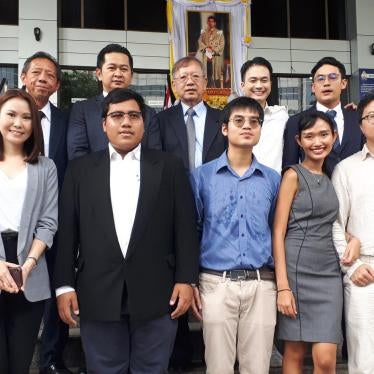Your Excellency Prime Minister General Prayut Chan-O-cha,
We, the undersigned organisations, working to secure a legal, ethical and sustainable fishing industry for Thailand, are writing to express our deep concern regarding the escalating demands of the National Fisheries Association of Thailand (NFAT) and request your intervention in these matters.
In recent months, NFAT has sought to abolish several critical fisheries enforcement regulations that are essential in Thailand’s fight against illegal, unreported and unregulated (IUU) fishing as well as associated human rights abuse on board fishing vessels. We urge the Royal Thai Government, Ministry of Agriculture and Cooperatives, Department of Fisheries, and Ministry of Labour to reject these demands and instead ensure the preservation and elevation of internationally recognised best practices in both fisheries and labour regulations.
We are aware that NFAT has presented the following list of demands to the Ministry of Agriculture and Cooperatives. These include:
- Permitting at-sea crew transfers and at-sea trans-shipment of seafood catch between fishing vessels: This would greatly reduce the ability of management agencies to scrutinise living and working conditions on board fishing vessels and increase the chances of workers being exploited and rotated amongst vessels without any chance of oversight from authorities. Historically, this tactic has often been used by illegal vessel operators to ensure that unregistered and trafficked workers could not escape from their fishing vessel, and would instead be confined at sea for months or even years. Such cases were, until recently, a common occurrence across the Thai fishing industry.[1] At-sea trans-shipment of catch can facilitate the laundering of illegally caught seafood into legal catches, thereby undermining efforts toward both legal and sustainable fisheries.
- Extend the time period in which vessel operators can revise vessel crew lists after they have left port: This could allow for additional workers to board vessels after official portside inspections have finished, facilitating human trafficking and labour exploitation along with the use of unregistered workers with little chance of oversight by relevant authorities.
- Extending the allowable number of fishing days per trip (currently limited to 30 days for domestic fishing vessels): Such an extension could increase fishing effort beyond sustainable levels whilst also increasing the chances of at-sea transfers of catch and crew occurring as vessels can fish further and for longer from shore.
- Removing the requirement that vessel operators fill in fishing coordinates in vessel logbooks: Accurate fishing location coordinates are essential to verify that seafood is caught in legal fishing grounds. It is a basic requirement for an effective fisheries management regime and removing this provision would likely undermine most other efforts towards legal and sustainable fisheries across the Thai fleet.
- Allowing for the renewal of fishing licenses for ‘locked’ commercial fishing vessels: This group of vessels was barred from fishing in 2015[2] and includes any fishing or fishing support vessels found to have invalid vessel registration or fishing license documents. Allowing these vessels to re-register and resume fishing will lead to over-fishing at a time when Thailand’s fish stocks are already severely depleted and only in the earliest stages of recovery. Such a reintroduction into the fleet would also negate current efforts to buy back and scrap excess vessels from the current fishing fleet. Crucially, unless fishing effort can be brought to, and kept at, sustainable levels all other efforts become meaningless in the longer term. This is because fisheries will decline and eventually collapse, devastating marine biodiversity, ruining livelihoods and businesses whilst costing Thailand vast sums of money in lost income.
Additional demands include removing the requirement for fishing vessels to undergo an annual multi-disciplinary inspection of crew and vessel conditions and relaxing reporting requirements for the ‘rest time recording sheet’ for fishing vessels. Such revisions risk obscuring living and working conditions on fishing vessels whilst making it harder for labour inspectors to effectively identify potential victims of human trafficking or forced labour.
All of the above regulations are critical components of Thailand’s monitoring, control and surveillance (MCS) mechanisms and any degradation or dissolution of these essential tools would be to the detriment of the positive reforms made to the fishing industry since 2015. They provide important transparency mechanisms that shed light on a historically opaque and unaccountable industry. They help to verify that seafood is being caught legally, ethically and sustainably and were deemed critical both for the removal of the yellow card from the European Commission as well as with the US State Department’s Trafficking in Persons report upgrade.
It is important to regard these reforms in the context of Thailand’s past. Before the European Commission formally warned Thailand for its failure to combat IUU fishing in April 2015, there were numerous documented cases of Thai vessels breaking the law and fishing illegally in countries across Southeast Asia.[3] Human trafficking, physical abuse and labour exploitation on board Thailand’s fleets were also widespread.[4][5][6][7] Weak financial penalties and punitive sanctions coupled with a lack of transparency across the sector provided little deterrent for unscrupulous vessel operators.[8][9] These factors had a significant and recognized impact on Thailand’s international reputation with several key industry leaders admitting the damage caused to the sector by the dark shadow of IUU fishing across the country.[10][11]
Since that time, the Royal Thai Government has worked hard to rectify the mistakes of the past, dedicated great effort and resources to secure and implement highly valuable reforms. In response to these efforts, the European Commission lifted the ‘yellow card’ warning against Thailand in January 2019. Today, acceptance of the damaging NFAT proposals and removal of these regulations would negate most of what made the lifting of the EU yellow card possible and will severely undermine Thailand’s position as a regional and international leader in the fisheries sector. Such action would once again undermine Thailand’s good image and reputation.
In order for Thailand to achieve a truly sustainable, legal and ethical fishery, future fishing industry reforms must be deliberated through participatory public consultations. We believe that it is to the detriment of Thailand’s artisanal fishers, coastal communities, and the marine ecosystem that they rely on conducting selective, closed-door meetings.
Together with the undersigned organisations – representing all parts of the seafood sector including suppliers and processors, exporters and retailers, artisanal fishers and concerned national and international organisations – we respectfully call upon the you, as Prime Minister, to address these growing concerns for the future of Thailand’s fisheries and the communities that depend on them for their way of life and survival.
We also respectfully urge you to ensure that any future reform process is conducted through an entirely open and transparent process that includes all relevant stakeholders, specifically including artisanal fishing communities, civil society, scientific and academic interests. An open process is essential to promote and foster healthy dialogue and multi-stakeholder engagement.
We believe that the Royal Thai Government has made genuine strides towards achieving a sustainable, legal and ethical fishing sector here in Thailand. NFAT’s unreasonable and dangerous demands risk isolating Thailand and its fishing sector at a time when the international community is steadily moving towards a more transparent and accountable industry.
We call on the Thai Government to ensure that the positive reforms of the past four years are preserved, preventing a reversal of the progress made to rectify the damage inflicted across previous decades of neglect.
Yours sincerely,
- CSO Coalition for Ethical and Sustainable Seafood
- Dabban Dabmueang Association
- Environmental Justice Foundation (EJF)
- Ethical Trading Initiative (ETI)
- Federation of Thai Fisherfolk Associations
- Foundation for Education and Development (FED)
- Fisherman Labour Group (FLG)
- FishWise
- Freedom Fund
- Freedom United
- Green America
- Greenpeace
- Human Rights and Development Foundation (HRDF)
- Human Rights Watch
- Humanity United
- IJM Foundation
- International Labor Rights Forum (ILRF)
- Krabi Sea Defenders Associations
- Labour Protection Network (LPN)
- Lyons Seafoods
- Manushya Foundation
- Migrant Worker Rights Network (MWRN)
- Migrant Working Group (MWG)
- Morrisons
- The Nature Conservancy
- Oxfam International
- Sainsbury’s
- Save Andaman Network
- Seafood Legacy Co. Ltd.
- Small-scale Fisherfolk Club of Satun
- Small-scale Fisherfolk Club of Trang
- Southern Fisherfolk Women Association
- Stella Maris Seafarers' Centre
- Stop the Traffik Australian Coalition
- Thai Sea Watch Association
- UK Seafood Industry Alliance
- Waitrose & Partners
[1] EJF (2015) Pirates and Slaves: How overfishing in Thailand fuels human trafficking and the plundering of our oceans https://ejfoundation.org/resources/downloads/EJF_Pirates_and_Slaves_2015_0.pdf
[2] Department of European Affairs (5 June 2018) IUU : Thailand Update No. 2 IUU Facts & Figures www.mfa.go.th/europetouch/th/news/8359/90095-Thailand-Update-No.-2-IUU-Facts-&-Figures.html
[3] Thammasat Business Law Journal (2018) Thailand’s compliance with International Standards Against Illegal, Unreported, and Unregulated Fisheries https://www.tci-thaijo.org/index.php/TBLJ/article/view/112589
[4] International Organization for Migration (2011) Trafficking of Fishermen in Thailand https://publications.iom.int/system/files/pdf/traffickingoffishermenthailand.pdf
[5] U.S. State Department (2014) Trafficking in Person Report https://2009-2017.state.gov/j/tip/rls/tiprpt/2014/
[6] BBC (2014) Forced to fish: Slavery on Thailand's trawlers https://www.bbc.com/news/magazine-25814718
[7] Associated Press (2015) US lets in Thai fish caught by slaves despite laws https://www.ap.org/explore/seafood-from-slaves/us-lets-in-thai-fish-caught-by-slaves-despite-law.html
[8] International Organization for Migration (2011) Trafficking of Fishermen in Thailand https://publications.iom.int/system/files/pdf/traffickingoffishermenthailand.pdf
[9] Thammasat Business Law Journal (2018) Thailand’s compliance with International Standards Against Illegal, Unreported, and Unregulated Fisheries https://www.tci-thaijo.org/index.php/TBLJ/article/view/112589
[10] Bangkok Post (2018) Fishing for renewed aspects https://www.bangkokpost.com/business/1500074/fishing-for-renewed-respect
[11] The Nation (2019) Fishery sector buoyed up after EU lifts yellow card https://www.nationthailand.com/national/30361948








